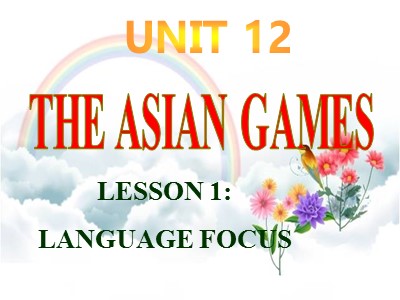Bài giảng Tiếng Anh 10 - Unit 12: The Asian games - Lesson 1: Language focus

+ Eg1: The woman is very friendly. She lives next door.
The woman who/ that lives next door is very friendly.
+ Eg2: This is the novel. Shakespeare wrote this novel.
This is the novel which/ that Shakespeare wrote.
This is the novel Shakespeare wrote.
+ Eg3: The girl is very nice. I talked about her yesterday.
The girl whom/ that I talked about yesterday is very nice.
The girl I talked about yesterday is very nice.
+ Eg4: The girl is very nice. I talked about her yesterday.
The girl about whom I talked yesterday is very nice.
+ Eg5: My Tam is a famous singer. I like her songs very much.
My Tam,who I like her songs very much, is a famous singer
Bạn đang xem tài liệu "Bài giảng Tiếng Anh 10 - Unit 12: The Asian games - Lesson 1: Language focus", để tải tài liệu gốc về máy bạn click vào nút DOWNLOAD ở trên
THE ASIAN GAMESUNIT 12LESSON 1:LANGUAGE FOCUS relative pronounswho whomwhichwhose thatGrammar Relative clausesOmission of relative pronouns + Eg1: The woman is very friendly. She lives next door.The woman who/ that lives next door is very friendly.+ Eg2: This is the novel. Shakespeare wrote this novel.This is the novel which/ that Shakespeare wrote.This is the novel Shakespeare wrote. + Eg3: The girl is very nice. I talked about her yesterday.The girl whom/ that I talked about yesterday is very nice.The girl I talked about yesterday is very nice.+ Eg4: The girl is very nice. I talked about her yesterday.The girl about whom I talked yesterday is very nice.+ Eg5: My Tam is a famous singer. I like her songs very much. My Tam,who I like her songs very much, is a famous singerSubjectObject Can’t omit Can omitObject Can omitObject after a preposition Can’t omitObject after a comma Can’t omit1.Chúng ta có thể lược bỏ đại từ quan hệ khi nó là tân ngữ ở mệnh đề quan hệ xác định2.Chúng ta không thể lược bỏ đại từ quan hệ khi nó là tân ngữ ở mệnh đề quan hệ không xác định+ mệnh đề quan hệ không xác định sau dấy phẩy.+ Nó là chủ ngữ.+ Nó đứng sau giới từ.Notes:Exercise 1: Complete each of the following sentences, using a suitable sentence in the box to make a relative clause without a relative pronoun. we had it for lunch we met him this morning John told them he invited them to the birthday party you lost it I bought it yesterday Example:I like the diamond ring Mary is wearing it1. Have you found the bike ..2. Most of the classmates ..........couldn’t come.3. The short stories .......were very funny.4. The dictionary .. .is expensive, but very interesting.5. I didn’t like the man 6. The beef ..was really delicious.we had it for lunchwe met him this morningJohn told themhe invited them to the birthday partyyou lost itI bought it yesterdayacfedb1. e 2. f 3. a 4. b 5. d 6. c Exercise 2: Complete each of the following sentences, using a suitable sentence in the box to make a relative clause with a preposition.we’re living in it they were talking about themI work with them we went to itI slept in it he applied for itI want to travel on itEx: The flight .. ..was fully booked.I enjoy my job because I like the people . The dinner party . . ... wasn’t very enjoyable.The house . ... is not in good condition.I wasn’t interested in the things .. He didn’t get the job . 6. The bed .. was very modern.a.we’re living in itb. they’re talking about themd. I work with themf.we went to ite. he applied for itc. I slept in itEXERCISE 3Tick () the sentences in which the relative pronoun can be omitted . 1. The girl who we are going to see is from Britain.2. He works for a company that makes cars.3. What was the name of the man who you met yesterday.4.The table that was broken has now been repaired.5. Do you know the girl who he is talking to ?6. This is the novel that I’ve been expecting. 1. Relative pronouns “who, whom, which, that” can be omitted when they are (1) ...a. objects in the defining clausesConsolidationb. objects in the non- defining clausesc. subjects in the defining clauses2. 2. But we can’t omit :a. When “ who, which, that” are objects. b. When “ who, which, that” stand before a subjectc. When “ who, which, that” stand before a verb2. 3. And we can’t omit :a. When “ who, which, that” are after a preposition. b. When “ who, which, that” stand behind a commac. When “ who, which, that” stand behind a preposition and after a commaDecide whether the statements are True(T) or False( F).Beckham whom I met on T.V yesterday, is a famous footballer.The dictionary which has 205,000 words is very useful.I’m reading the book I bought in 1996.I know the girl to who I spoke this morning.Dan Truong, that sings “Tinh khuc vang” song, is a singer.Do you know the film whom he is talking to?This puppy, my grandfather gave me on my birthday, is 9 months old.The table was broken has now been repaired.The ladder on I was standing began to slip.This is Mr. Hung, who writes the script of the film.FTTFFFFFFT, whom whowhichThis puppy, which my grandfather gave me on my birthday, is 9 months old.The table that/ which was broken has now been repaired.The ladder on which I was standing began to slip.HomeworkRedo exercises in textbook.Prepare for the next lesson: unit 12: Reading ( read at home in advance)THANK YOUGOOD BYE
Tài liệu đính kèm:
 bai_giang_tieng_anh_10_unit_12_the_asian_games_lesson_1_lang.pptx
bai_giang_tieng_anh_10_unit_12_the_asian_games_lesson_1_lang.pptx



